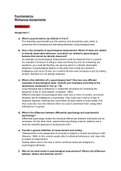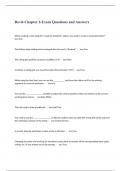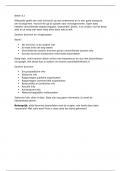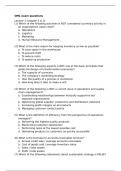Workgroup Assignments
Workgroup 1
Assignment 1
a) What is psychometrics (as defined in Furr)?
Furr describes psychometrics as the science, and procedures used, which is
concerned with evaluating and estimating attributes of psychological tests.
b) Give a few examples of psychological measurement. Which of these are related
to directly observable behaviour, and which are related to psychological
features that cannot be directly observed?
An example of a psychological measurement could be response time in a person.
For example if someone is sitting in class and being shy and not answering any
questions, you could tell that they are nervous which is a directly observable
behaviour. A psychological feature on the other hand would be a person’s
intelligence such as an IQ test, you couldn't tell how smart someone is just by looking
at them, therefore it is not directly observed.
c) What is (the definition of) a psychological test? Give two very different
examples of psychological tests. Classify your examples according to the
dimensions mentioned in Furr (p. 7-8).
A psychological test is defined by a “systematic procedure for comparing the
behaviour of two or more people” (Cronbach, 1960).
Different examples of psychological tests could vary in terms of content, and would
therefore test for intelligence or personality. They could vary in terms of type of
response required, meaning they could either be open ended or close ended. And
they could also vary the methods which are used to administer them, being either
individual or in a group.
d) What is the difference between differential psychology and experimental
psychology?
Differential psychology studies the individual differences between individuals and its
processes. On the other hand, experimental psychology looks for patterns and is
more the scientific approach to studying the mind.
e) Provide a general definition of measurement and scaling.
“Measurement is the assignment of numerals to objects or events according to rules”
(Stevens, 1946). In this, events usually refer to individual behaviours, and rules refer
to scales of measurement.
Scaling refers more to the way in which numerical values are assigned to
psychological attributes.
f) Why do we need norms in psychological measurement? What is the difference
between relative and absolute norms?





